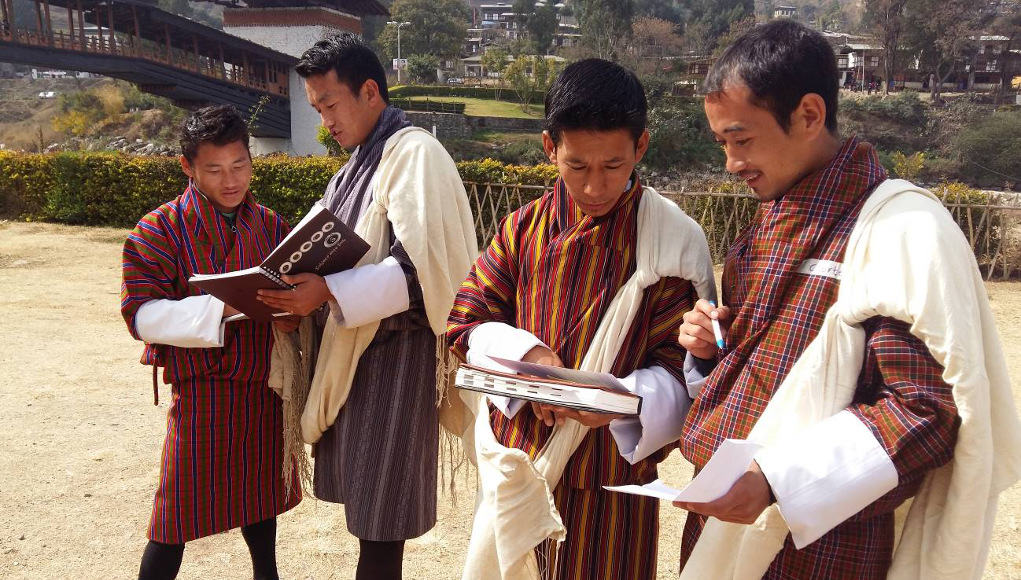Can Relevant Learning Boost Gross National Happiness?

By Leslie Cook
Place-based education makes learning relevant to students. By asking questions about place, and designing solutions to problems that emerge as students learn about a place, students become immersed in the community processes that surround them on a daily basis.
The Kingdom of Bhutan is in the Himalayas between India and China. Much of the modern educational system and curriculum in Bhutan has been adopted from India, and many educators in the country have sought to “Bhutanize” the curriculum.
In striving to make their educational system and curriculum their own, Bhutan’s Ministry of Education and Royal Education Council have blended the traditional values and modern practices while making education relevant to students. The country’s Gross National Happiness policy provides a strong backdrop for introducing relevant learning through place-based education with an emphasis on boosting community vitality and well-being.

Relevant learning has taken hold in many schools in Bhutan. In the “class six” (sixth grade) science curriculum, the lesson on separating materials is deeply rooted in students’ daily experiences. As the foundation for learning about separating materials, the teacher facilitates students creating short interviews with community members to inquire about how various locally produced grains (such as rice, beans, peas, dal, wheat, etc.) are separated from the stalk. Students spend time observing how those separation methods are carried out and try those methods for themselves.
Students then come back to class with the different methods of separation, and knowledge around what grains are mostly successfully separated with that method. In this case, a topic that could seem abstract and distant is brought into the daily lives of students who across the country see agricultural practices in action on their trip to school each day.
In a high school literature unit on love and marriage, reading literature from around the world is contextualized with a local understanding of the culture of love and marriage. Bhutanese students prepare for reading Marriage is a Private Affair by Chinua Achebe and Wuthering Heights by Emily Brontë by interviewing family and community members about love and marriage in their own lives. The class will then use what they learn about the cultures of love and marriage in Bhutan to frame and understand more deeply the same themes exemplified in modern day Nigeria and in Victorian England.

Since 2008, Teton Science Schools has been partnering with the Royal Education Council and Royal University of Bhutan to expand the practice of place-based education. Training and programs that teachers and lecturers have been a part of since 2008 have led to teachers reporting greater connection to place, new teaching strategies used in their classrooms, improved quality of teaching, and greater student and teacher inspiration, satisfaction and engagement. Of the training and professional development in place-based education, one teacher said:
“Before attending the place-based education workshop, I never thought of connecting the local place with the students. […] After attending this work, I changed my style of teaching. I see that my students are learning locally and then they can build up that knowledge to apply to new places.”
Relevant, meaningful learning experiences that connect to their lives engage students in school and in the communities where they live. Bhutan is finding great success in training teachers on place-based education and writing curriculum that connects schools and communities. Their example shows that place-based education can happen anywhere.
This blog is part of our “Place-Based Education” blog series. To learn more and contribute a guest post for the series, check out the PBE campaign page. Join in the conversation on social media using #PlaceBasedEd. For more on Place-Based Education see:
- Getting Smart Podcast | Experiencing Place-Based Education at Teton Science Schools
- Cultivating Cross-Cultural Competence in Costa Rica
- Powerful School-Community Partnership Brings Learning to Life
- 5 Levels of Place-Based Learning Implementation
Leslie Cook is Senior Director of Educator Development at Teton Science Schools. Follow TSS on Twitter at @TetonScience.
Stay in-the-know with all things EdTech and innovations in learning by signing up to receive the weekly Smart Update. This post includes mentions of a Getting Smart partner. For a full list of partners, affiliate organizations and all other disclosures, please see our Partner page.






0 Comments
Leave a Comment
Your email address will not be published. All fields are required.